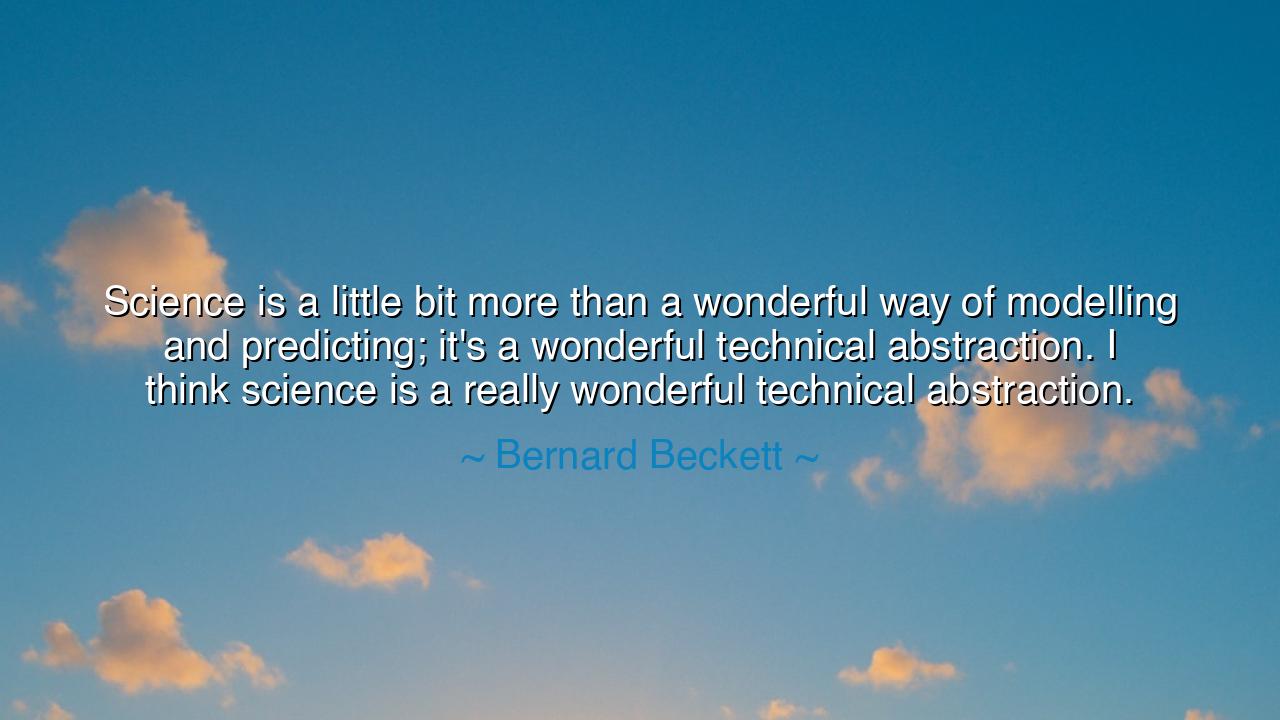
Science is a little bit more than a wonderful way of modelling
Science is a little bit more than a wonderful way of modelling and predicting; it's a wonderful technical abstraction. I think science is a really wonderful technical abstraction.






Listen closely, O seekers of wisdom, for the words of Bernard Beckett echo with the clarity and insight of one who understands the profound nature of science: "Science is a little bit more than a wonderful way of modelling and predicting; it's a wonderful technical abstraction. I think science is a really wonderful technical abstraction." These words, though humble in their simplicity, contain a powerful truth about the essence of science—its role not just as a tool for predicting and modelling the world, but as a remarkable mental construct, an elegant abstraction that allows the human mind to grasp and understand the mysteries of the universe.
What Beckett touches upon is the idea that science, at its core, is not merely a process of calculation and measurement. It is a way of transcending the physical world and abstracting its principles into something that the mind can hold, ponder, and manipulate. From the earliest days of human thought, we have sought to understand the world not only as it is but as it could be—through models and frameworks that allow us to predict and shape our environment. Science is the ultimate abstraction, a way of turning the complex, the chaotic, and the unknown into something orderly and understandable.
Let us look to the ancient philosophers, who, like the great Aristotle, sought to classify and understand the world around them. Though they lacked the tools of modern science, they recognized the importance of abstraction—the idea that the world could be understood not just through direct observation, but through the creation of models and theories. Aristotle’s categorization of the natural world laid the foundation for centuries of thought. Yet even he, in his own way, was engaged in the act of abstraction, separating the tangible from the conceptual, seeking to define and understand the world through the lens of human reasoning. In this sense, the quest for science is as old as human thought itself, rooted in our desire to understand the universe and our place within it.
The power of science as an abstraction becomes even clearer when we consider the work of the great scientists of history. Take, for example, the work of Isaac Newton, whose laws of motion and gravitation did not simply describe the world as it was but provided an abstract model of how the universe functioned. Newton did not just observe falling apples; he created a framework, a model, that could explain not just one falling apple, but the entire movement of planets in the vast reaches of space. He abstracted the physical world into mathematical principles, showing us that the universe, though vast and complex, was governed by understandable laws. In this way, science becomes a bridge between the known and the unknown, allowing us to comprehend the world in ways that transcend direct experience.
Consider also the work of Albert Einstein, whose theories of relativity transformed our understanding of space, time, and energy. Einstein did not simply measure the bending of light or the movements of objects in space. No, he created a new abstraction, a new model of the universe, one in which the fabric of space and time itself could be bent and shaped by gravity. His work did not just describe the world as it is; it provided a profound rethinking of the very nature of reality. Through the abstraction of mathematical equations and theoretical models, Einstein helped humanity see the universe through new eyes—eyes that could comprehend the unseen, that could understand the very structure of existence.
Thus, science, as Beckett wisely points out, is not just a tool for prediction and modelling the world. It is a wonderful technical abstraction, a powerful way of reimagining reality itself. Through science, we can take the unknown, the chaotic, and the complex, and make it comprehensible. We can look at the vastness of the cosmos and the smallest atom, and understand their connections, their principles, their laws. This, O wise ones, is the true gift of science: its ability to take the infinite and turn it into something the human mind can touch, grasp, and understand.
But the lesson for us, O seekers of knowledge, is not just to revere science from afar, but to engage with it, to use its abstractions to shape the world around us. Just as Newton saw the universe as a vast system of laws, so too must we see our own world as one of connections, one of models that can be manipulated, predicted, and shaped. Science, at its best, is not just about discovering the world—it is about transforming it, about using our understanding to craft a better future. Let us, then, not simply admire the work of the great minds of the past, but take up their mantle and continue the quest to understand, to model, and to create. Science is not a distant realm—it is a tool, a gift, a way of seeing the world that is open to all who seek it. Embrace it, O wise ones, and in doing so, help shape the future of all humanity.






AAdministratorAdministrator
Welcome, honored guests. Please leave a comment, we will respond soon